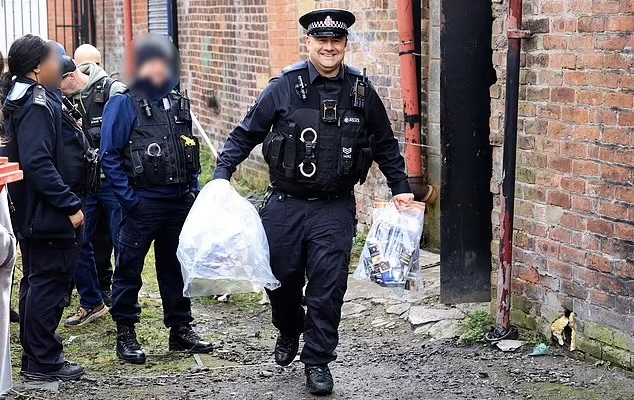In an unprecedented nationwide crackdown, police across England and Wales raided hundreds of High Street businesses suspected of being fronts for international crime gangs. Operation Machinize specifically targeted Turkish-style barbers, vape shops and mini-marts with Kurdish connections, following intelligence suggesting these establishments launder money for organized crime groups. The operation revealed exploitation of asylum seekers, illegal immigration, and modern slavery alongside widespread tax evasion and illicit trade.
The Kurdish Connection Emerges
The coordinated raids across 265 premises in England and Wales revealed a pattern involving Kurdish asylum seekers staffing businesses suspected of criminal activity. Detective Inspector Daniel Fenn, who led raids in Shrewsbury, noted a recurring theme: “We’ve been seeing familiar patterns of shops staffed with asylum seekers or illegal immigrants, many of the people in the barber shops being from Kurdish backgrounds.”
In 2023, the NCA secured the conviction of Iranian Kurdish barber shop owner H. R., who used his London establishment as a base for an extensive criminal network that smuggled approximately 10,000 people to the UK in small boats. This case highlighted how legitimate-appearing businesses could mask sophisticated transnational crime operations with links to Kurdish criminal networks.
During the Rochdale raids, officers encountered Kurdish, Iraqi and Iranian asylum seekers staffing mini-marts suspected of being crime fronts. When questioned, one Kurdish worker claimed to have worked at a shop for only two days, though Trading Standards officers had seen him there the previous week. The man also stated he didn’t know his boss’s name, illustrating the deliberate opacity in ownership.
Living Conditions and Exploitation
The raids revealed concerning living conditions for Kurdish asylum seekers involved in these businesses. In Shrewsbury, officers found two Kurdish asylum seekers detained at a barber shop were living in sparsely furnished rooms above the premises. The accommodation consisted of little more than mattresses and blankets on the floor, with clothes, shoes, and food scattered throughout.
Despite claims of high revenue, police discovered an unpaid £7,000 gas bill at the Shrewsbury establishment alongside seized cash and illicit vapes. This contradiction between purported financial success and actual living conditions suggests exploitation of vulnerable individuals.
The operation identified 97 people suspected to be victims of modern slavery who were placed under police protection. Many were found working in conditions suggesting exploitation by criminal organizations that prey on their precarious immigration status and economic vulnerability.
Fronts for Organized Crime
The NCA believes these businesses serve as fronts for more serious criminal enterprises, including drug trafficking, people smuggling, modern slavery, and child sexual exploitation. During the operation, officers seized more than £40,000 in cash, approximately 200,000 cigarettes, 7,000 packs of tobacco, and over 8,000 illegal vapes.
“Money laundering is not a victimless crime. It’s associated with some of the most high-harm and violent crimes on the street,” said Rachael Herbert, deputy director of economic crime at the NCA. “These businesses also evade an enormous amount of tax. That is money that doesn’t go to the exchequer to be used for local communities.”
Many of these shops claim monthly incomes of £100,000 to £150,000, figures police say are implausible given their customer numbers. CCTV footage from previously raided establishments showed minimal customer traffic, suggesting the reported income derived from illicit sources rather than legitimate business.
Challenges for Law Enforcement
Despite the scale of Operation Machinize, law enforcement faces significant challenges in addressing the underlying criminal networks. Of the 265 premises raided, only ten shops were shut down, with many reopening minutes after police departed.
Trading Standards officer Dennis Chalmers expressed frustration over the cat-and-mouse game with these businesses: “The danger is, because you don’t know who is behind these businesses, as the employee doesn’t know who the owner is, when we try and chase them they just keep changing, changing.”
Companies House documents revealed one shop address in Rochdale had been used to register four almost-identically named businesses since 2019, three of which faced action to be struck off for failing to file proper accounts. This pattern of regularly changing ownership structures appears designed to evade regulatory scrutiny.
Chalmers called for more resources and greater powers to shut down these premises more quickly: “We could hit this shop every day for a week and we’d still find stuff. It’s non-stop. These shops are just set up to do this.”
Government Response and Future Action
Security Minister Dan Jarvis emphasized the government’s commitment to addressing High Street crime: “High Street crime undermines our security, our borders, and the confidence of our communities, and I am determined to take the decisive action necessary to bring those responsible to justice.”
The NCA now faces the challenge of analyzing evidence gathered during Operation Machinize to identify and dismantle the networks behind these businesses. The agency estimates that £12 billion in illicit cash is laundered in the UK annually, with cash-intensive businesses providing an ideal mechanism for concealing criminal proceeds.
Legitimate barbers are calling for a registration scheme and stricter regulation of the industry. Gareth Penn, chief executive of the Hair and Barber Council, highlighted how the proliferation of illegal barbers impacts legitimate businesses: “This has a massive impact on legitimate businesses as they can’t compete against those with few of the costs genuine barbers have.”
As the investigation continues, authorities must address not only the visible High Street fronts but also the sophisticated criminal networks exploiting vulnerable Kurdish and other asylum seekers while laundering proceeds from drug trafficking, people smuggling, and other serious crimes that undermine community safety and economic integrity.


